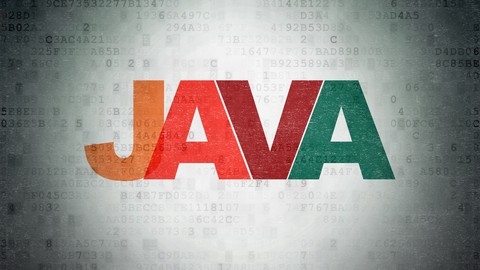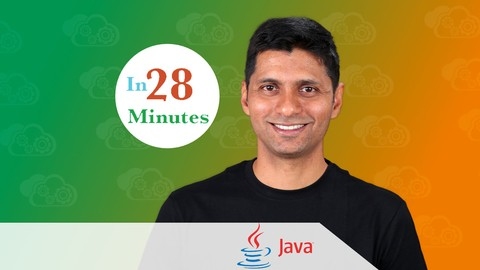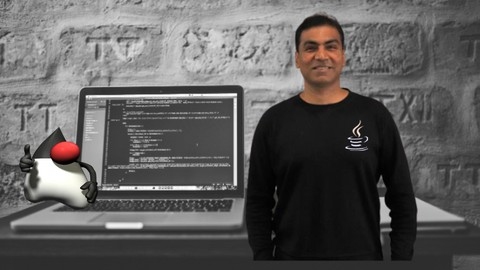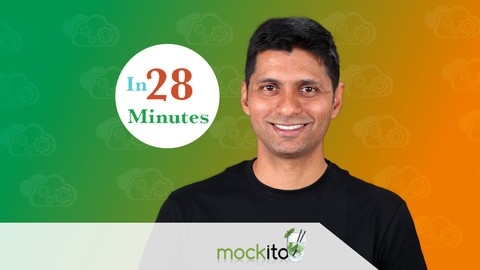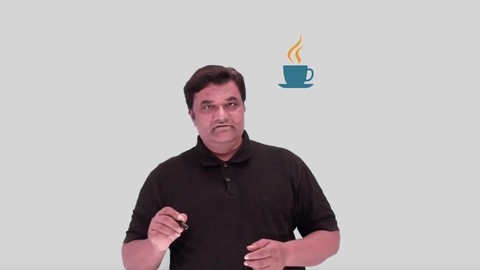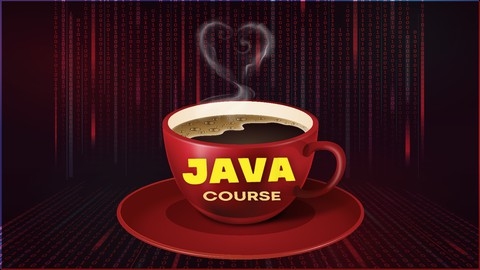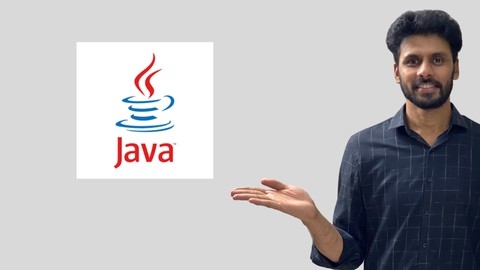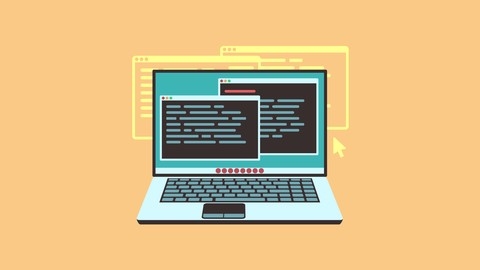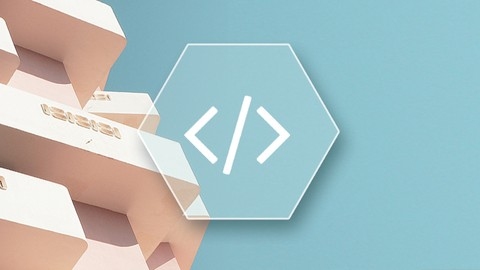Java is a versatile and widely used programming language, empowering developers to create everything from mobile apps to enterprise systems.
Mastering Java unlocks a world of career opportunities and opens doors to building innovative solutions for various industries.
Finding the right Java programming course on Udemy can be a challenging task.
You want a course that’s comprehensive, engaging, and taught by experts, but also caters to your learning style and goals.
We’ve meticulously reviewed numerous courses and based on our analysis, Java 17 Masterclass: Start Coding in 2024 is the best course overall on Udemy.
This comprehensive program starts with the basics, guiding you through setting up JDK 17 across different operating systems and crafting your first “Hello World” program.
It quickly moves into core concepts like variables, expressions, and understanding primitive types, with practical challenges to test your knowledge.
The course also covers essential topics like Object-Oriented Programming, control flow statements, file I/O, networking, databases, and creating graphical user interfaces with JavaFX.
While this is our top pick, other fantastic Java programming courses are available on Udemy.
Keep reading to discover our recommendations for various learning styles and goals, covering everything from beginner-friendly introductions to advanced courses focused on specific Java frameworks and tools.
Java 17 Masterclass: Start Coding in 2024
This course starts with the basics, guiding you through setting up JDK 17 across different operating systems and crafting your first “Hello World” program.
Quickly, it moves into core concepts like variables, expressions, and understanding primitive types, with practical challenges to test your knowledge.
Transitioning to a professional coding environment, you’ll learn to use IntelliJ IDEA, an essential skill for any aspiring Java developer.
The course covers control flow statements such as if-then, switch, and loops, crucial for decision-making and executing repetitive tasks in your code.
A significant focus is on Object-Oriented Programming (OOP), where you’ll explore classes, objects, inheritance, and polymorphism.
These concepts are vital for writing efficient and scalable Java applications, and the course reinforces this with hands-on exercises.
Beyond the basics, you’ll dive into advanced topics like file I/O, networking, databases, and creating graphical user interfaces with JavaFX.
These skills are in high demand, making you a competitive candidate in the job market.
The course also updates you on modern Java features, including lambda expressions, streams, and the new Date and Time API.
Plus, it equips you with debugging and unit testing skills using JUnit, crucial for maintaining high-quality software.
Java Programming for Complete Beginners
The course starts by introducing you to Java programming and guiding you through the installation process for different operating systems like Windows, Mac, and Linux.
It covers troubleshooting tips to ensure a smooth setup.
You’ll then dive into Java programming by solving the Multiplication Table challenge using JShell, an interactive tool for learning Java.
This hands-on approach helps you understand Java expressions, printing output, variables, and basic programming concepts like conditionals and loops.
As you progress, you’ll learn about Java methods, including arguments, parameters, and return values.
You’ll also explore the Java platform, covering topics like Java classes, objects, JDK, JRE, and JVM.
The course integrates Eclipse, a popular Java IDE, to help you create and debug Java projects more efficiently.
The syllabus covers essential programming concepts like object-oriented programming (OOP), inheritance, abstraction, polymorphism, and encapsulation through practical examples and exercises.
You’ll learn to design classes, work with objects, and understand the relationships between them.
The course dives deep into Java’s primitive and reference data types, including integers, floating-point numbers, booleans, characters, strings, and wrapper classes.
You’ll also learn about collections like lists, sets, queues, and maps, which are crucial for managing and manipulating data.
Functional programming in Java is introduced, covering lambda expressions, streams, and operations like filter, map, and reduce.
You’ll learn how to write more concise and expressive code using these concepts.
Multithreading and concurrency are covered, enabling you to write efficient and responsive applications.
You’ll explore thread creation, synchronization, and the Executor Service for managing threads.
Exception handling is another essential topic, teaching you how to handle and throw exceptions gracefully, ensuring your applications are robust and maintainable.
The course also covers working with files and directories, as well as advanced concurrency topics like concurrent collections and atomic operations.
Throughout the course, you’ll work on numerous coding exercises and projects, reinforcing your understanding of Java programming concepts.
The exercises range from simple tasks to more complex problems, gradually increasing in difficulty.
Additionally, the course introduces you to Java’s new features from versions 10 to 16, including modularization, new APIs, and language enhancements like local variable type inference and switch expressions.
The syllabus also covers popular frameworks and tools like Spring Framework, Spring Boot, JUnit for unit testing, and Maven for build automation and dependency management.
The Complete Java Certification Course
This comprehensive program starts by teaching you how to set up your development environment for writing Java 8 and Java 9 applications using Eclipse on Windows and Mac.
You’ll begin with the basics of computer programming and write your first Java program.
The course then dives into core Java concepts like variables, data types, arrays, control flow statements, and methods.
It covers object-oriented programming principles like classes, objects, inheritance, interfaces, and abstract classes.
As you progress, you’ll learn to work with strings, loops, and debugging techniques.
The course includes two practical projects - one on building a car dealership system and another on processing stock market data - to apply what you’ve learned.
You’ll gain skills in building executable Java programs using JAR files, file processing, exception handling, and working with collections like lists, sets, and maps.
The course teaches Java generics and how to write multithreaded applications using concepts like thread safety and the producer-consumer pattern.
It covers Java Database Connectivity (JDBC) to interact with databases like MySQL.
You’ll explore new Java 9 features like JShell and learn about lambda expressions and the Streams API introduced in Java 8.
Throughout the course, you have access to dedicated TA support and can join an online community on Discord.
The lectures provide career advice and bonus content to supplement your learning.
Java In-Depth: Become a Complete Java Engineer!
The course starts by giving you a high-level overview of Java, its history, and its unique features like platform independence and the Java Virtual Machine (JVM).
You’ll learn how to set up your development environment and write your first Java program.
One of the core concepts covered is Object-Oriented Programming.
You’ll dive deep into classes, objects, inheritance, polymorphism, abstract classes, and interfaces.
These fundamental OOP principles are essential for writing well-designed, maintainable code.
The course covers all the basics of Java programming, including data types, operators, control flow statements, strings, and more.
You’ll learn best practices for coding conventions, information hiding, and using the Eclipse IDE for debugging and unit testing with JUnit.
A significant portion of the course is dedicated to Java’s Collections Framework, which includes data structures like lists, sets, maps, and queues.
You’ll learn how to effectively use these data structures and write efficient code.
Advanced topics like generics and nested classes are covered in-depth, helping you write more flexible and reusable code.
Concurrency is a crucial aspect of modern programming, and this course covers threads, synchronization, and the Java Memory Model (JMM).
You’ll learn how to write thread-safe code and use concurrency utilities like the Executor Framework.
Proper exception handling is essential for robust applications.
The course teaches you how to handle exceptions effectively, following best practices like exception translation and chaining.
You’ll learn about Java’s I/O capabilities, including reading and writing files, serializing objects, and working with character encodings.
The course covers relational databases, database design, and the Java Database Connectivity (JDBC) API for interacting with databases from Java programs.
With the introduction of lambdas and streams in Java 8, the course explores functional-style programming, teaching you how to write more concise and expressive code.
The course introduces you to web development with Java, covering servlets, JavaServer Pages (JSP), and the Java EE (Enterprise Edition) platform.
To deepen your understanding of Java, the course delves into JVM internals, covering topics like the lifetime of a type, reflection, garbage collection, and the JVM’s runtime data areas.
Throughout the course, you’ll work on a real-world case study: implementing a social bookmarking application.
This hands-on project will help you apply the concepts you’ve learned and gain practical experience.
The course is well-structured, with clear explanations, demos, and coding exercises to reinforce your understanding.
The instructor maintains a conversational tone while providing the necessary technical details, making it easy to follow along.
Learn Java Unit Testing with Junit & Mockito in 30 Steps
The course begins with an introduction to unit testing and why it’s crucial for writing high-quality code.
You’ll set up your first JUnit test and learn assertions like assertEquals, assertTrue, and assertFalse.
The course covers important JUnit concepts like @Before, @After, @BeforeClass, @AfterClass for setup/teardown, testing arrays, exceptions, performance, parameterized tests, and organizing tests into suites.
Before diving into Mockito, you’ll learn about the need for mocking and set up a Maven project.
The course then guides you through writing your first Mockito code, stubbing with argument matchers, BDD-style given/when/then syntax, verifying calls on mocks, and capturing arguments.
Advanced Mockito topics include Hamcrest matchers, annotations like @Mock, @InjectMocks, @Captor, JUnit rules, real-world examples with Spring, spies, and why Mockito doesn’t stub final/private methods.
You’ll also learn PowerMock for mocking static and private methods, constructors, and writing good tests.
Throughout the course, you’ll find tips on efficient learning, remembering concepts long-term, teaching others, and the importance of deep work.
Learn JAVA Programming - Beginner to Master
You’ll start by learning the basics, like installing the JDK and writing your first program.
Then, you’ll dive into data types, variables, and operators, laying the foundation for more advanced concepts.
The course takes you through essential topics like conditional statements, loops, and arrays, providing hands-on practice and challenges to reinforce your understanding.
You’ll also explore object-oriented programming principles, including classes, objects, inheritance, and polymorphism.
As you progress, you’ll learn about advanced Java features like packages, exception handling, multithreading, and the java.lang package.
The syllabus covers annotations, lambda expressions, and Java I/O streams, equipping you with the skills to build robust applications.
Importantly, you’ll gain experience with Java’s powerful collection framework, working with data structures like ArrayList, LinkedList, HashSet, and TreeMap.
You’ll also learn about the Date and Time API, network programming, and JDBC for database connectivity using SQLite.
The course introduces you to Java’s GUI toolkits, including AWT and Swing, teaching you how to create user interfaces and handle events.
Additionally, you’ll explore JavaFX, a modern framework for building rich client applications.
Throughout the syllabus, you’ll find quizzes and student challenges that reinforce your learning and provide opportunities for practical application.
Java Programming for Complete Beginners
The course starts by guiding you through setting up the essential tools like the JDK and Eclipse IDE, ensuring you have the proper environment for coding.
From there, you’ll dive into the fundamentals with “Hello World” and learn about variables, strings, loops, and conditional statements through hands-on lectures and quizzes.
This lays a solid foundation before moving on to more advanced concepts like user input, arrays, classes, objects, and methods.
The course covers key object-oriented programming principles like inheritance, polymorphism, and encapsulation.
You’ll also explore packages, constructors, static and final keywords, providing a comprehensive understanding of Java’s core features.
But it doesn’t stop at the basics.
You’ll learn file handling with the Scanner class, working with strings using StringBuilder, and implementing the equals method.
The ternary operator is also covered, giving you a concise way to write conditional expressions.
To solidify your learning, you’ll build a “Guess The Word” game project, applying the concepts you’ve learned in a practical way.
This hands-on experience is invaluable for reinforcing your skills.
The second part dives deeper into advanced topics like exception handling, abstract classes, inner classes, lambda expressions, enums, and serialization.
You’ll also learn about essential data structures like ArrayLists, LinkedLists, HashMaps, and various Set implementations.
Multithreading is a crucial aspect covered in-depth, including starting threads, using the volatile and synchronized keywords, thread pools, CountDownLatch, wait and notify, re-entrant locks, and semaphores.
Keeping up with the latest Java features, the course covers switch expressions, the var keyword, text blocks, sealed classes, record classes, virtual threads, and more from Java 10 to Java 21.
To solidify your learning, you’ll tackle coding exercises covering various topics like counting even numbers, student exam scores, polymorphism, grades, age verification, shopping lists and carts, voting systems, movie rating systems, and synchronizing threads with bank accounts.
Core Java Made Easy (Covers the latest Java 18)
The course starts by introducing you to Java and Object-Oriented Programming (OOP) concepts like classes, objects, inheritance, polymorphism, and encapsulation.
You’ll learn how to set up the Java Development Kit (JDK) and an Integrated Development Environment (IDE) like Eclipse to write and run your first Java program.
Next, it dives into core Java fundamentals - data types, variables, operators, control flow statements, and methods.
You’ll understand how to work with primitive data types, wrapper classes, type casting, and autoboxing/unboxing.
The course covers arithmetic, relational, bitwise operators, and the ternary operator in detail.
It then moves on to advanced OOP concepts like access modifiers, packages, inheritance, abstraction, polymorphism, and encapsulation.
You’ll learn to create abstract classes, interfaces, and understand the differences between them.
The course also covers inner classes, anonymous classes, and lambda expressions introduced in Java 8.
Error handling is crucial, and you’ll learn about Java’s exception handling mechanisms, including try-catch blocks, finally, and throwing custom exceptions.
Multithreading is covered extensively, from creating and managing threads to synchronization, deadlock, and the Executor framework.
The course explores Java’s powerful Collections framework, including Lists, Sets, Maps, and Queues.
You’ll learn to work with generics, type erasure, and use concurrent collections for thread-safe operations.
Other important topics like enums, I/O streams (file I/O), serialization, arrays, the Object class, regular expressions, annotations, and reflection API are also covered in-depth.
The course keeps you up-to-date with the latest Java features, covering additions from Java 9 through Java 18, such as modules, switch expressions, pattern matching, records, and more.
Hands-on coding examples and assignments are provided throughout the course, including building a dating app, flight reservation system, and solving coding problems.
You’ll also learn about additional tools like JShell, Maven, JUnit, socket programming, and debugging fundamentals.
Java 8 New Features In Simple Way
You’ll start by learning how to write lambda expressions and work with functional interfaces.
The course then dives into using lambda expressions with collections, exploring how they simplify sorting and other operations.
Next, you’ll compare anonymous inner classes to lambda expressions and understand their differences.
The course covers default and static methods in interfaces, a key Java 8 feature.
It provides in-depth coverage of predefined functional interfaces like Predicate, Function, Consumer, and Supplier, with numerous examples illustrating their usage.
The material also covers two-argument functional interfaces (BiPredicate, BiFunction, BiConsumer), primitive type functional interfaces, and the UnaryOperator and BinaryOperator interfaces.
You’ll learn about method and constructor references using the double colon (::) operator.
Streams, a powerful abstraction for processing data, are covered extensively, including various stream operations like filter(), map(), and others.
The new Date and Time API is also explained in detail.
Throughout the course, you’ll work on practical examples that reinforce the concepts, such as removing spaces from strings, calculating salaries, user authentication, and more.
Practice Java by Building Projects
The course starts with an introduction that covers the prerequisites and guides you through setting up your Java environment.
Then, it dives right into the first project - building an email administration application for creating accounts for new hires at an IT company.
You’ll learn how to generate random passwords, define email departments, and implement methods to set and get account details.
Next up is a student database application.
This project will teach you how to create a student class, generate unique IDs, handle enrollment and tuition payments, and work with arrays of objects.
Practical stuff that translates well to real jobs.
But the highlight is the bank account application project.
You’ll build different account types like savings and checking accounts, with features like interest rates, safety deposit boxes, and debit cards.
The project covers object inheritance, using super constructors, generating account numbers, reading data from CSV files, and more.
It’s a comprehensive project that covers many core Java concepts.
Throughout, you’ll be building full-fledged applications from the ground up, getting experience with project setup, class design, constructors, methods, access modifiers and more.
The hands-on nature is ideal for solidifying your understanding of Java by applying concepts to build complete programs.
Also check our posts on:
